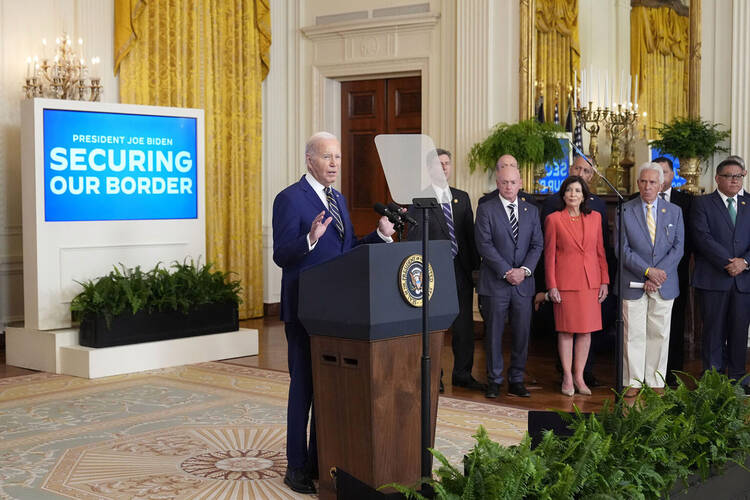(RNS) — President Joe Biden signed an executive order Tuesday (June 4) dramatically limiting the number of immigrants who may apply for asylum at the southern United States border. The policy pauses entry at the border, starting Wednesday, once 2,500 illegal entries have occurred in any 24-hour period.
The executive order follows two failed efforts in Congress this year to pass bipartisan immigration reforms, including a bill negotiated between Republican and Democratic lawmakers that was blocked in the Senate in January after GOP presidential candidate Donald Trump criticized it.
Tuesday’s action by the Biden White House drew fierce backlash from agencies that partner with the federal government to resettle refugees once they are processed by the Border Patrol. Six of those nine agencies are faith-based and have a long history of advocating for immigrants.
HIAS, one of the faith-based agencies, issued a statement denouncing the border shutdown order as “wrong” and “ineffective.”
“This is a blatant political move and won’t achieve anything the administration says it will,” said Naomi Steinberg, HIAS’ vice president of policy and advocacy. “It’s disturbing that this political maneuvering is being done on the backs of asylum-seekers and is blatantly against the law. It will not help or make the border more secure.”
Steinberg fears the executive order will force people with bona fide asylum claims to return to dangerous situations that they fled in their home countries or wait in dangerous conditions in Mexico. While the executive order claims to enforce “expanded efforts to dismantle human smuggling,” Steinberg also expressed fears the order will do the opposite, allowing smugglers to take advantage of increasingly desperate people.
In a statement, Kelly Ryan, president of the Jesuit Refugee Service/USA, said the group was “deeply disappointed” in the Biden administration’s efforts to restrict asylum and urged it to work with Central American countries and Mexico to improve immigrants’ prospects.
The new policy relies on the same authority, known as 212(f), that the Trump administration invoked in 2018 to deny asylum to those who crossed illegally. Federal courts struck the policy down because it violated U.S. immigration law, which allows the right to seek asylum regardless of the manner of entry.
In response to the executive order, Krish O’Mara Vignarajah, president and CEO of Global Refuge, formerly Lutheran Immigration and Refugee Service, shared Steinberg’s view that the executive order puts migrants at risk.
“Sending those seeking asylum back to the conditions they are fleeing without their chance to exercise their right is a dubious prospect,” said Vignarajah. “We have serious concerns about the implications of today’s pronouncement.”
Vignarajah said that while the Biden administration is “hamstrung” due to congressional inaction, there are ways to both secure the borders and offer robust humanitarian protections.
HIAS President and CEO Mark Hetfield said U.S. immigration law has not kept up with 21st-century migration trends. “Rather than fixing an antiquated immigration system that has been broken for decades,” he said, “politicians are using anti-immigrant rhetoric to gain votes by stoking fear.”








